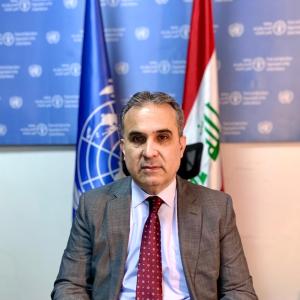FAO launches the SIDA funded project, Enhanced Climate Resilience of vulnerable agriculture households in Southern Iraq
18 December 2022
Najaf, 15 December 2022 - Under the patronage of the Minister of Agriculture, H.E Abbas JabrAl-Aliawi, the Food and Agriculture Organization of the United Nations (FAO) in Iraq launched in Najaf the project “Enhanced Climate Resilience of vulnerable agriculture households in Southern Iraq” funded by the Swedish International Development Cooperation Agency (Sida).

The ceremony chaired by the FAO Representative, Dr Salah ELHajjHassan, was attended by Najaf Governor, high officials from Najaf, Missan, Muthanna and ThiQar, Representatives from the farmers union, academia, private sector and other relevant stakeholders.
H.E Minister of Agriculture thanked the Government of Sweden and FAO for the support provided to improve the wellbeing and livelihoods of women and men in rural communities in Southern Iraq; he also highlighted the importance of improving agriculture practices from traditional to new and more sustainable technologies, in line with the government policy, to mitigate the impact of climate change and water scarcity on vulnerable families.
Governor of Najaf, Dr Majid Al-Waeli said “the project is a great opportunity for Najaf and Southern Iraq, as the country is facing serious environmental challenges including a threat of water shortages”. “I expect the project to optimize water use in agriculture value chains, as well as strengthening coordination between public and private extension services to increase the adoption of advanced production technologies and practices”.
FAO Representative, Dr Salah ELHajj Hassan thanked the Governments of Sweden, the Government of Iraq and underlined the strong cooperation with the line Ministries, local government and relevant stakeholders. “FAO has a high level of technical knowledge and experience in agriculture, food security and nutrition, especially the international standards and best practices for livelihood recovery and resilience, agricultural and rural development and climate change adaptation”. “FAO activities will continue empowering rural women as agents of change for climate adaptation, said FAO Representative.
The project is designed to respond to the constraints faced by the agriculture sector in terms of water availability due to global climatic change and aim to enhance the climate resilience of farming communities by increasing and stabilizing water availability at the farm gate; optimizing agriculture and water productivity; and reducing the adaptation deficit of farming communities via specific and tailored trainings and capacity development processes. The activities aim further to strengthen water management institutions and the water distribution regime and to enhance the strategic framework and stakeholder engagement for a climate resilient agricultural development.
The project will be implemented in coordination with the Ministries of Agriculture, Environment and Water Resources and other national and local stakeholders, will also tackle existing challenges in the development of major value chains by promoting climate smart agricultural methodology to ensure gender and social inclusion, ecosystem health and biodiversity and reduced soil, water and air pollution.

He started his career in 1984, as Senior Research Assistant in the Agricultural Research and Education Centre (AREC), American University of Beirut. From 1987 to 1991, he was Coordinator of the Student Training Programme, and also Agriculture and Horticultural Teacher for the Faculty of Agriculture, at the Lebanese University.
From 1991 to 1995, he worked as Agricultural Engineer at the Ministry of Agriculture, Bekaa Regional Office, Zahlah and was then assigned to the Agricultural Research Institute in the Tal Amara station, first as Head of the Crop Production Department and subsequently in charge of the Plant Protection Laboratory. From 2002 to 2006, he was Director of the Kfardane Research Station (Agricultural Research Institute). In 2008, he became Visiting Scientist at the International Maize and Wheat Improvement Centre (CIMMYT) and Coordinator of a project with the International Centre for Atomic Energy Agency, Vienna.
In 2010, he served as Advisor to the Minister for Agriculture of Lebanon. In 2011, he became President of the Pesticide Scientific Committee, Head of the Phytoplasma Committee and Director of the Agriculture and Rural Development Programme (ARDP) (EU-funded project). From 2010 to 2013, he represented Lebanon in negotiations with EU, Egypt, Jordan and Iraq. During his career, Mr Hajj Hassan also carried out a number of other functions. He represented the Lebanese Agricultural Research Institute (LARI) in several research programmes with the International Centre for Agricultural Research in the Dry Areas (ICARDA) and the American University of Beirut. He was Coordinator of the Mashreq/Maghreb project with ICARDA, representing Lebanon in the Steering Committee, as well as being the Head of the Sugar-beet Delivery and of the Wheat Delivery Committees. For a number of years, Mr Hajj Hassan worked for the preparation of FAO TCP projects and served as the National Director of a TCP project. He joined FAO in January 2014 as FAO Representative in Yemen. Mr Hajj Hassan succeeds Mr El Zubi as FAO Representative in Iraq.


